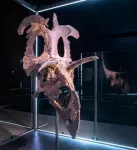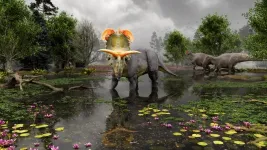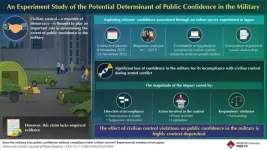Changing climate will make home feel like somewhere else
Interactive app shows how climate change will make places around the world feel like they are closer to the equator
2024-06-20
(Press-News.org) Changing climate will make home feel like somewhere else
Interactive app shows how climate change will make places around the world feel like they are closer to the equator
FROSTBURG, MD (June 20, 2024)—The impacts of climate change are being felt all over the world, but how will it impact how your hometown feels? An interactive web application from the University of Maryland Center for Environmental Science allows users to search 40,581 places and 5,323 metro areas around the globe to match the expected future climate in each city with the current climate of another location, providing a relatable picture of what is likely in store.
You may have already experienced these changes where you live and may be wondering: What will climate of the future be like where I live? How hot will summers be? Will it still snow in winter? And perhaps How might things change course if we act to reduce emissions? This web application helps to provide answers to these questions.
For example, if you live in Washington, D.C., you would need to travel to northern Louisiana to experience what Washington, D.C., will feel like by 2080, where summers are expected to be 11.5°F warmer in 50 years. If you live in Shanghai, China, you would need to travel to northern Pakistan to experience what Shanghai’s climate could be like in 2080.
“In 50 years, the northern hemisphere cities to the north are going to become much more like cities to the south. Everything is moving towards the equator in terms of the climate that’s coming for you,” said Professor Matthew Fitzpatrick. “And the closer you get to the equator there are fewer and fewer good matches for climates in places like Central America, south Florida, and northern Africa. There is no place on earth representative of what those places they will be like in the future.”
A spatial ecologist, Fitzpatrick used climate-analog mapping, a statistical technique that matches the expected future climate at one location—your city of residence, for instance—with the current climate of another familiar location, to provide a place-based understanding of climate change. He used the most recent available data from the Intergovernmental Panel on Climate Change (IPCC), the United Nations body for assessing the science related to climate change, to illustrate anticipated temperature changes over 30 years under two different scenarios.
Because the answer to these questions depends on how climate is expected to change and the specific nature of those changes is uncertain, the app provides results for both high and reduced emissions scenarios, as well as for several different climate forecast models. You can map the best matches for your city for these different scenarios and models as well as map the similarity between your city’s future climate and present climates everywhere (based on the average of the five forecasts for each emission scenario).
The first scenario that users can search is similar to our current trajectory and assumes very high greenhouse gas emissions, in which the planet is on track to warm around 9 degrees F by the end of this century. This scenario would make the earth warmer than it likely has been in millions of years. The second scenario is similar to what the planet would feel like if nations pursue Paris Climate Accord goals. Under that scenario, the planet warms by about 3 degrees F by immediately and drastically reducing human-caused greenhouse gases emissions.
“I hope that it continues to inform the conversation about climate change. I hope it helps people better understand the magnitude of the impacts and why scientists are so concerned,” said Fitzpatrick.
Search the interactive climate map for your city at www.umces.edu/futureurbanclimates
UNIVERSITY OF MARYLAND CENTER FOR ENVIRONMENTAL SCIENCE
The University of Maryland Center for Environmental Science leads the way toward better management of Maryland’s natural resources and the protection and restoration of the Chesapeake Bay. From a network of laboratories located across the state, UMCES scientists provide sound evidence and advice to help state and national leaders manage the environment, and prepare future scientists to meet the global challenges of the 21st century. www.umces.edu
# # #
END
ELSE PRESS RELEASES FROM THIS DATE:
2024-06-20
What do you get when you cross Norse mythology with a 78-million-year-old ancestor to the Triceratops? Answer: Lokiceratops rangiformis, a plant-eating dinosaur with a very fancy set of horns.
The new dinosaur was identified and named by Colorado State University affiliate faculty member Joseph Sertich and University of Utah Professor Mark Loewen. The dinosaur’s name, announced today in the scientific journal PeerJ, translates roughly to “Loki’s horned face that looks like a caribou.”
Loewen and Sertich, co-lead authors of the PeerJ study, dubbed the new species Lokiceratops (lo-Kee-sare-a-tops) ...
2024-06-20
In democracies where civilian control is followed, the power to make crucial decisions, like those of national security, is mainly exercised by elected officials, allowing the citizens who elect them to influence such decisions indirectly. This role can give people a sense of participation in matters of national importance, potentially associated with their political trust. The military, in such cases, advises and helps these elected leaders in serving the nation, rather than assuming leadership itself. A balance between civilians and military organizations is, therefore, crucial for any democracy to thrive, and it is pointed out that civilian control is a requisite of democracy.
Existing ...
2024-06-20
Indolo[2,3-a]quinolizidine is a common structural motif in various natural products. Its molecular structure contains the indole ring, a functional group in tryptophan. Tryptophan, an essential amino acid, is required for the production and maintenance of our body’s proteins, muscles, enzymes, and neurotransmitters. Many natural products are derived from it. Over 3,000 monoterpene indole alkaloids (MTIAs), which are natural products consisting of indole rings, have been found in plants, and some of them have been used as medicines. For example, vinblastine has been used as an anticancer drug, and reserpine is used to treat high blood pressure.
The ...
2024-06-20
WINSTON-SALEM, N.C. – June 20, 2024 – Women who have their ovaries removed before menopause, particularly before the age of 40, have reduced white matter integrity in multiple regions of the brain later in life. White matter refers to the nerve fibers that connect neurons in different areas of the brain.
The findings appear online today in Alzheimer’s & Dementia: The Journal of the Alzheimer’s Association.
“We know that having both ovaries removed before natural menopause causes abrupt endocrine dysfunction, which increases ...
2024-06-20
The composition of the intestinal flora can predict the chances of developing serious infections such as pneumonia. Researchers from Amsterdam UMC and the University of Turku, Finland, followed more than 10,000 people for 6 years. More than 600 people who had less healthy intestinal flora developed a serious infection, with this leading in some cases to death. The results of the study are published today in The Lancet Microbe.
The 602 people who were hospitalised due to an infection showed at the start of the study that they had fewer butyrate-producing ...
2024-06-20
PULLMAN, Wash. -- A wearable health monitor developed by Washington State University researchers can reliably measure levels of important biochemicals in sweat during physical exercise.
The 3D-printed monitor could someday provide a simple and non-invasive way to track health conditions and diagnose common diseases, such as diabetes, gout, kidney disease or heart disease.
Reporting in the journal, ACS Sensors, the researchers were able to accurately monitor the levels of volunteers’ glucose, lactate ...
2024-06-20
Scientists have prototyped a new method for “rationally engineering” enzymes to deliver improved performance. They have devised an algorithm, which takes into account an enzyme’s evolutionary history, to flag where mutations could be introduced with a high likelihood of delivering functional improvements.
Their work – published today in leading journal Nature Communications – could have significant, wide-ranging impacts across a suite of industries, from food production to human ...
2024-06-20
A new paper in Biology Methods & Protocols, published by Oxford University Press, indicates that it may soon be possible for doctors to use artificial intelligence (AI) to detect and diagnose cancer in patients, allowing for earlier treatment. Cancer remains one of the most challenging human diseases, with over 19 million cases and 10 million deaths annually. The evolutionary nature of cancer makes it difficult to treat late-stage tumours.
Genetic information is encoded in DNA by patterns of the four bases—denoted by A, T, G and C—that make ...
2024-06-20
In October 2018, Canada enacted the Cannabis Act in Canada (CAC), which legalised the non-medical use of cannabis. A new study has found that the rate of cannabis-related disorders diagnosed among pregnant women in the Canadian province of Québec increased by more than 20% after the enactment of the CAC, while rates for all other drug- and alcohol-related disorders remained stable. The study is published today in the scientific journal Addiction.
This study measured changes to the monthly rates of diagnosed cannabis-related disorders (CRDs) in the pregnant population in Québec. Since 2010 the monthly average number of CRDs has increased consistently, ...
2024-06-20
Bottom Line: Cancer survivors who identify as lesbian, gay, bisexual, transgender, queer, or anything other than straight and cisgender (LGBTQ+) experience more chronic health conditions, disabilities, and other physical and cognitive limitations than non-LGBTQ+ cancer survivors; however, the prevalence of most conditions was highest among transgender or gender non-conforming (TGNC) individuals.
Journal in Which the Study was Published: Cancer Epidemiology, Biomarkers & Prevention, a journal of ...
LAST 30 PRESS RELEASES:
[Press-News.org] Changing climate will make home feel like somewhere else
Interactive app shows how climate change will make places around the world feel like they are closer to the equator







